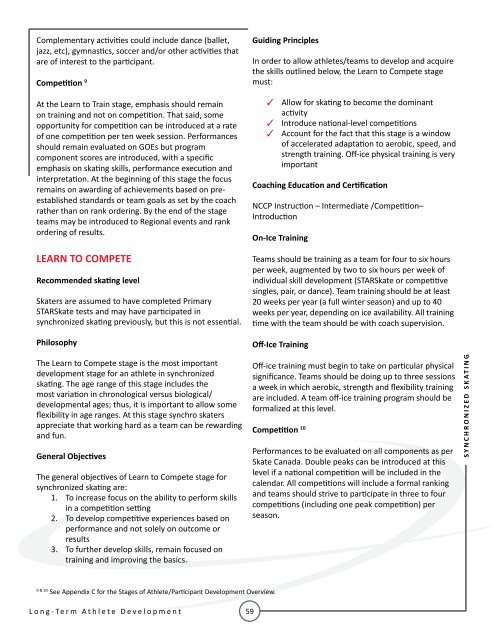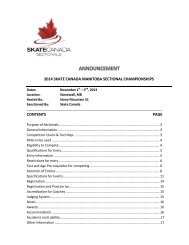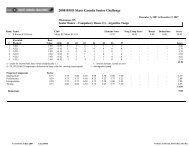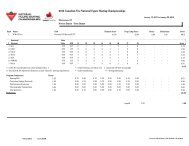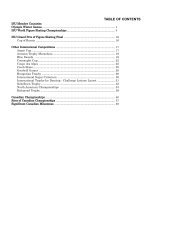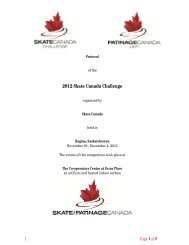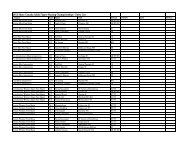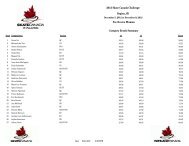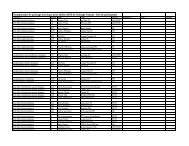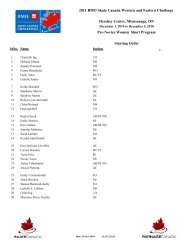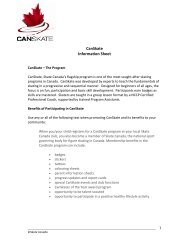LONG-TERM ATHLETE DEVELOPMENT - Skate Canada
LONG-TERM ATHLETE DEVELOPMENT - Skate Canada
LONG-TERM ATHLETE DEVELOPMENT - Skate Canada
Create successful ePaper yourself
Turn your PDF publications into a flip-book with our unique Google optimized e-Paper software.
Complementary activities could include dance (ballet,<br />
jazz, etc), gymnastics, soccer and/or other activities that<br />
are of interest to the participant.<br />
Competition 9<br />
At the Learn to Train stage, emphasis should remain<br />
on training and not on competition. That said, some<br />
opportunity for competition can be introduced at a rate<br />
of one competition per ten week session. Performances<br />
should remain evaluated on GOEs but program<br />
component scores are introduced, with a specific<br />
emphasis on skating skills, performance execution and<br />
interpretation. At the beginning of this stage the focus<br />
remains on awarding of achievements based on preestablished<br />
standards or team goals as set by the coach<br />
rather than on rank ordering. By the end of the stage<br />
teams may be introduced to Regional events and rank<br />
ordering of results.<br />
LEARN TO COMPETE<br />
Recommended skating level<br />
<strong>Skate</strong>rs are assumed to have completed Primary<br />
STAR<strong>Skate</strong> tests and may have participated in<br />
synchronized skating previously, but this is not essential.<br />
Philosophy<br />
The Learn to Compete stage is the most important<br />
development stage for an athlete in synchronized<br />
skating. The age range of this stage includes the<br />
most variation in chronological versus biological/<br />
developmental ages; thus, it is important to allow some<br />
flexibility in age ranges. At this stage synchro skaters<br />
appreciate that working hard as a team can be rewarding<br />
and fun.<br />
General Objectives<br />
The general objectives of Learn to Compete stage for<br />
synchronized skating are:<br />
1. To increase focus on the ability to perform skills<br />
in a competition setting<br />
2. To develop competitive experiences based on<br />
performance and not solely on outcome or<br />
results<br />
3. To further develop skills, remain focused on<br />
training and improving the basics.<br />
9 & 10 See Appendix C for the Stages of Athlete/Participant Development Overview.<br />
L o n g - Te r m A t h l e t e D e v e l o p m e n t<br />
In order to allow athletes/teams 865 Sheord Road, to Ottawa, develop Ontario and K1J acquire 1H9<br />
Phone 613.747.1007 I Toll Free 1.888.747.2372 I Fax 613.748.5718 I Toll Free Fax 1.877.211.2372<br />
59<br />
Guiding Principles<br />
the skills outlined below, the Learn to Compete stage<br />
must:<br />
3 Allow for skating to become the dominant<br />
activity<br />
3 Introduce national-level competitions<br />
3 Account for the fact that this stage is a window<br />
of accelerated adaptation to aerobic, speed, and<br />
strength training. Off-ice physical training is very<br />
important<br />
Coaching Education and Certification<br />
NCCP Instruction – Intermediate /Competition–<br />
Introduction<br />
On-Ice Training<br />
Teams should be training as a team for four to six hours<br />
per week, augmented by two to six hours per week of<br />
individual skill development (STAR<strong>Skate</strong> or competitive<br />
singles, pair, or dance). Team training should be at least<br />
20 weeks per year (a full winter season) and up to 40<br />
weeks per year, depending on ice availability. All training<br />
time with the team should be with coach supervision.<br />
Off-Ice Training<br />
Off-ice training must begin to take on particular physical<br />
significance. Teams should be doing up to three sessions<br />
a week in which aerobic, strength and flexibility training<br />
are included. A team off-ice training program should be<br />
formalized at this level.<br />
Competition 10<br />
Performances to be evaluated on all components as per<br />
<strong>Skate</strong> <strong>Canada</strong>. Double peaks can be introduced at this<br />
level if a national competition will be included in the<br />
calendar. All competitions will include a formal ranking<br />
and teams should strive to participate in three to four<br />
competitions (including one peak competition) per<br />
season.<br />
S Y N C H R O N I Z E D S K A T I N G


